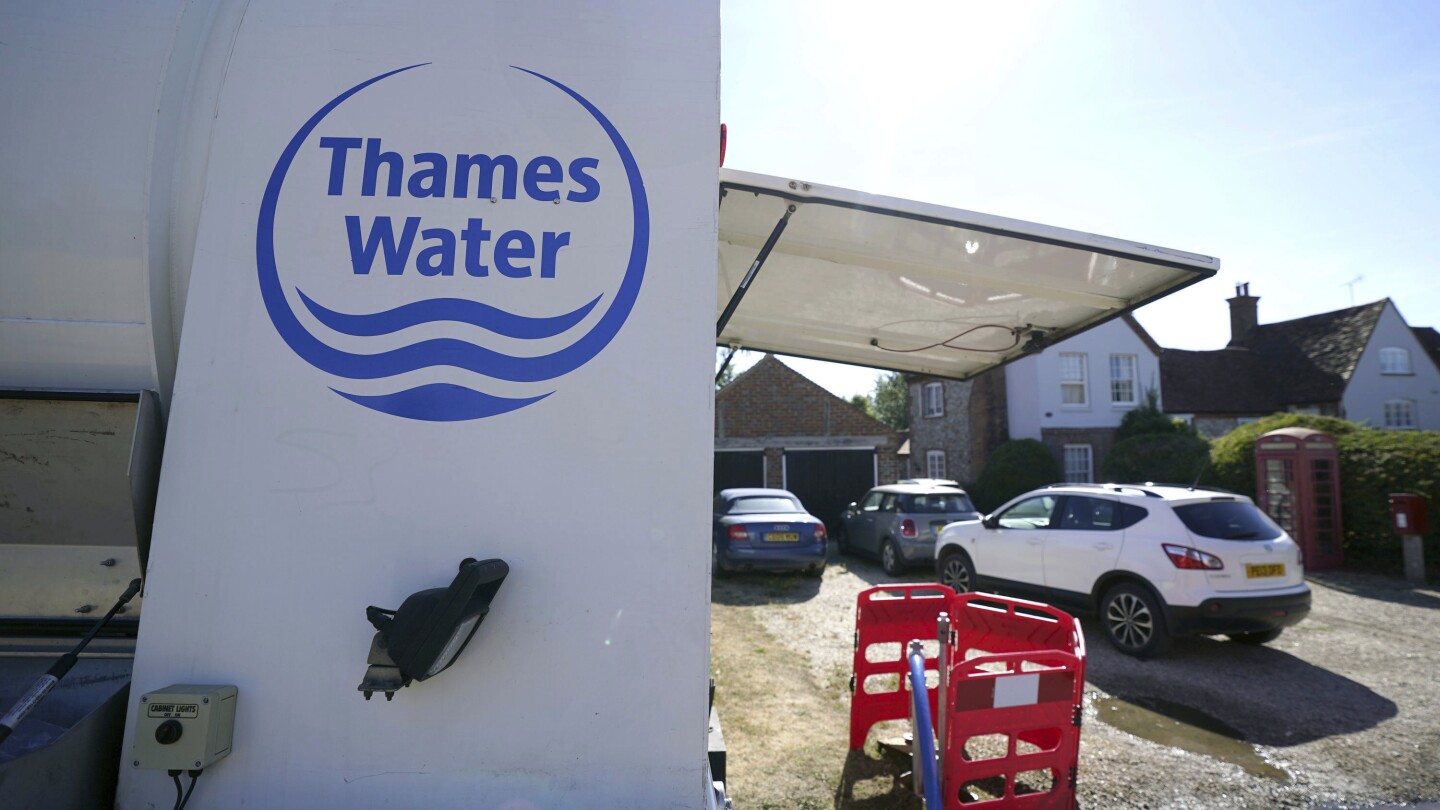LONDON (AP) — British regulators on Thursday slashed proposed rate increases by water companies, crimping revenue at a time they are struggling to persuade investors to finance efforts to reduce sewage spills that have fouled waterways around the country.
Under the draft decision by regulator Ofwat, Thames Water, Britain’s biggest water company, would be allowed to raise consumer bills by 23% over the next five years, about half of the 44% the company sought.
The decision comes four months after shareholders of Thames Water, which serves 16 million people in and around London, pulled the plug on 500 million pounds ($643 million) of emergency funding, saying regulators had made the company “uninvestable.” That has triggered speculation the government may nationalize the company to keep water flowing in the capital.
The prospect of big rate increases has sparked outrage in Britain, where consumers are angry about the companies’ failure to prevent sewage spills that have blighted lakes, rivers and coastal waterways. Critics complain that the companies created the problem by putting off needed upgrades while taking on billions of pounds of debt and paying generous dividends to their investors.
“Let me be very clear to water companies,” Ofwat Chief Executive David Black said. “We will be closely scrutinizing the delivery of their plans and will hold them to account to deliver real improvements to the environment and for customers and on their investment programs.”
But Water UK, a trade body for the water industry, said the proposed increases don’t provide enough money to improve sewage treatment and increase water supply.
“For far too long, Ofwat has failed to be realistic about the levels of investment needed and what it will take to deliver and maintain necessary infrastructure,’’ the trade body said. “We cannot allow this pattern to repeat itself.’’
The proposed rate increases will allow the companies to invest 35 billion pounds ($45 billion) to reduce pollution and improve customer service, triple the figure in the last rate review, Ofwat said. In response to concerns about past spending, investment funding will be monitored so money that isn’t spent on the specified projects will be returned to customers.
Britain’s water and sewage companies are facing demands that they upgrade Victorian-era pipes and sewers, increase water supplies for a growing population and comply with tougher environmental regulations.
At the same time, they are being forced to deal with wetter weather caused by climate change, which puts more pressure on overburdened sewers. Rather than allow sewage to back up into homes, water companies are permitted to release it into waterways during heavy storms.
The number of such discharges jumped 54% in 2023, the sixth-wettest year since records began, according to the Environment Agency. However, the agency cautioned that the figures weren’t directly comparable because the number of monitored storm outflows also increased.
Britain’s new left-leaning government on Thursday announced plans for a reform of the water industry, saying it would ensure the companies cut illegal sewage releases and attract private investment to upgrade their systems.
“We will never look the other way while water companies pump sewage into our rivers, lakes and seas,’’ Environment Secretary Steve Reed said in a statement. “This unacceptable destruction of our waterways should never have been allowed, but change has now begun so it can never happen again.”
Britain’s water companies were privatized in 1989 under the business-friendly policies of Prime Minister Margaret Thatcher.
Since that time, private companies have run 11 regional monopolies that provide both water and sewage service, plus five more that only provide water.
Because consumers have no choice over who supplies their water and sewage services, rates charged by the utilities are set by regulators. Ofwat reviews the rates every five years to make sure they provide enough income to cover the cost of regular operations, maintenance and system upgrades, as well as a reasonable profit margin for the operators.
Thursday’s draft decision will be open for comment until August, with a final decision scheduled for mid-December.
Thames Water, which was privatized with no debt, now owes 15 billion pounds ($19 billion) to its creditors.
In annual results released Tuesday, the company said it would run out of money by next spring unless it persuaded investors to pump more money into the company.
Chairman Adrian Montague argued against any effort to nationalize the company, saying that a “market-based solution” would be better for consumers and the environment.
Analysts have warned that government intervention could undermine investor confidence in other British water companies, threatening funding for the entire industry.
“A lack of synergy adds real risk to U.K. infrastructure investment in the round, with the challenges facing Thames Water having the potential to spread further afield into other sectors,” Montague said in the annual report.
Aarin Chiekrie, an analyst at Hargreaves Lansdown in London, said Thames Water investors have been holding off on providing new funding until today’s decision.
“It’s unclear as yet whether today’s figures will be enough to convince investors to supply new funding to the company or allow it to sink and be rescued by the government,” Chiekrie said.

